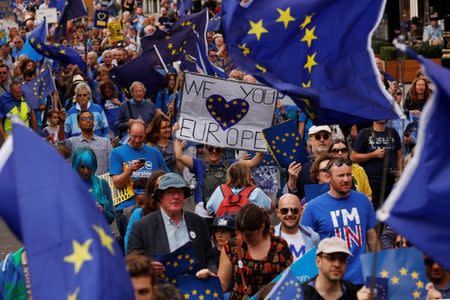UK appears headed for 'hard Brexit', Scots minister says after talks
By Andrew Callus PARIS (Reuters) - Britain appears to be heading for a "hard Brexit" under which links to the European Union would be reduced to little more than trade agreements, Scotland's external affairs minister Fiona Hyslop said on Monday, citing "mood music" from recent talks. Pro-EU Scotland's Brexit representative, Michael Russell, has had the first of a series of meetings with Brexit minister David Davis, Hyslop told Reuters. The talks are part of efforts to establish a common United Kingdom position for divorce discussions with the country's European Union partners, as Prime Minister Theresa May has promised. Russell will be lobbying for a "soft" exit "that looks as much like remaining in the EU as possible," ideally including continued free movement of capital and labour, she said. "They've met within the last 10 days. The process for those internal negotiations is currently being established," Hyslop told Reuters in Paris after a meeting with France's European Affairs Minister Harlem Desir. "I'm worried just now that the UK looks as if it's heading to a hard Brexit. However those internal discussions with Scotland, Wales and Northern Ireland have only just started, so we will try and shift that position," she said. "That's the mood music," she added, "but (Prime Minister) Theresa May is keeping everything very close to her chest and is very much determining the UK position," Hyslop said. Some 62 percent of Scottish voters opted to remain in the EU in the June 23 referendum, in which 52 percent of Britons overall voted to leave. Russell and his fellow representatives from Wales and Northern Ireland have no power of veto in their talks with Davis, Secretary of State for Exiting the European Union. However, Scotland has threatened to push for a referendum on independence if the Brexit terms are not to its liking. A 'hard Brexit' would be entirely unacceptable, Hyslop added. "We're looking to either influence the UK position or have a position that recognises the differences within the UK, including Scotland. But we have also said that if required we are prepared to look at a referendum on independence again. That's not our starting point, but it's there should it be needed." Britain's vote to quit the EU has sent shockwaves through the country and the EU, where it is one of the three main economies. Economists are concerned the divorce will hurt economic growth and pro-EU politicians fear it will weaken the union. May has repeatedly said that Article 50 will not be triggered before the end of the year, and that Britain will not get a bad deal. Although Scots had decided in a 2014 referendum on independence to remain in the United Kingdon, Scottish First Minister Nicola Sturgeon has said the Brexit vote meant that the country was now being taken out of the EU against its will and this could justify a second referendum. (Reporting by Andrew Callus; editing by Michel Rose)

 Yahoo News
Yahoo News 


